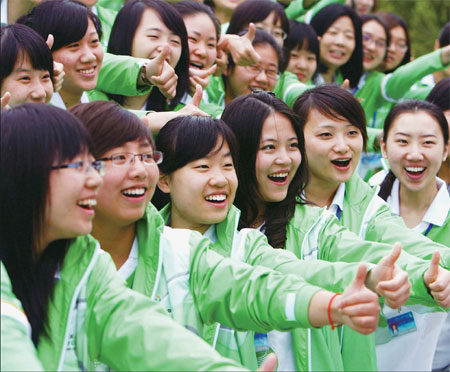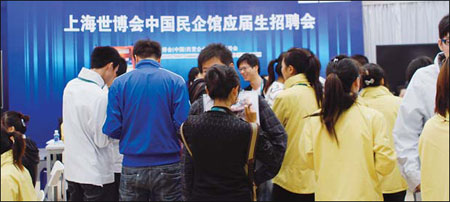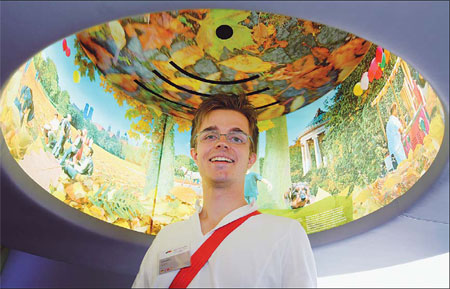 |
|
Young volunteers hope the skills they have picked up at the Expo can give them an edge in China's notoriously competitive job market. [Zhang Peijian / Xinhua]
|
There is a pot of gold at the end of the rainbow for those Expo volunteers who have been lucky enough to land jobs by means of networking or job fairs, writes Yu Ran.
The Private Enterprise Pavilion has launched a series of job fairs for graduate volunteers at the Expo, most of whom will find themselves out of work on Oct 31 when the six-month event ends.
China's job market is notoriously competitive, which is one of the reasons why the organizers behind these fairs decided to repay the volunteers by giving their job-hunting a boost, said Zhang Lin, the pavilion's executive president.
"Considering that our graduate volunteers will have difficulty finding jobs after the Expo, we launched a recruitment scheme in September among private enterprises and began staging job fairs, " he said. Zhang is in charge of the recruitment scheme.
 |
|
Volunteers attend a job fair in September. [Photos Provided to China Daily]
|
Three fairs were held in September. These saw 10 private enterprises offer 400 positions to 130 graduates at the pavilion, giving them an average of three positions each from which to choose, said Zhang.
Most Expo volunteers work for a two-week period during the May-October Expo, but the majority of those in the corporate pavilions on the Puxi side have signed one-year contracts. These made room for several months of training and the Expo's soft opening. There are an average of 5,000 volunteers on active duty inside the Expo Garden at any one time.
Next month, some will return to their studies. Others will fret about how to kick-start their careers. The fortunate few will already have paid jobs waiting for them.
Yao Qian, a 22-year-old graduate volunteer from Anhui province, belongs in the last category. He received an offer from a real estate company as a brand promotion officer, and said that spending half a year at the Private Enterprise Pavilion had paid dividends.
"The Expo has given me new skills in terms of being able to communicate better, being able to multitask, and, generally, being more confident," he said. "These are things I didn't learn in four years at university."
 |
|
Sebastian Kuhne, a press assistant with the Germany Pavilion, has already landed another job in Shanghai after the Expo. [Yovohagrafie / Germany Pavilion]
|
Foreign students have also lucked out at the Expo. Germany's Sebastian Kuhne went from being a host at the Germany Pavilion to a press assistant, before a German-funded tent manufacturer offered him a job in its marketing and sales department.
"Participating in the Expo and staying in Shanghai has been my dream since I started learning Chinese. The Expo has definitely been a major turning point of my life. It has given me a chance to build up my skill base and continue working in this city," said the 24-year-old.
Kuhne originally served as one of 192 tour guides at the pavilion, culled from a list of 3,500 applicants. He said giving directions and answering enquires in Chinese was like cramming for his final exams.
"I had to memorize about 1,000 pages of materials to get ready for the opening of the Expo during a six-week training period from March. It was extremely tough, because we could only imagine what the pavilion would be like at that time," he said.
Kuhne studied at Shanghai's Tongji University, majoring in business administration. He took an internship at a German toy company in Ningbo, Zhejiang province, for his third year.

